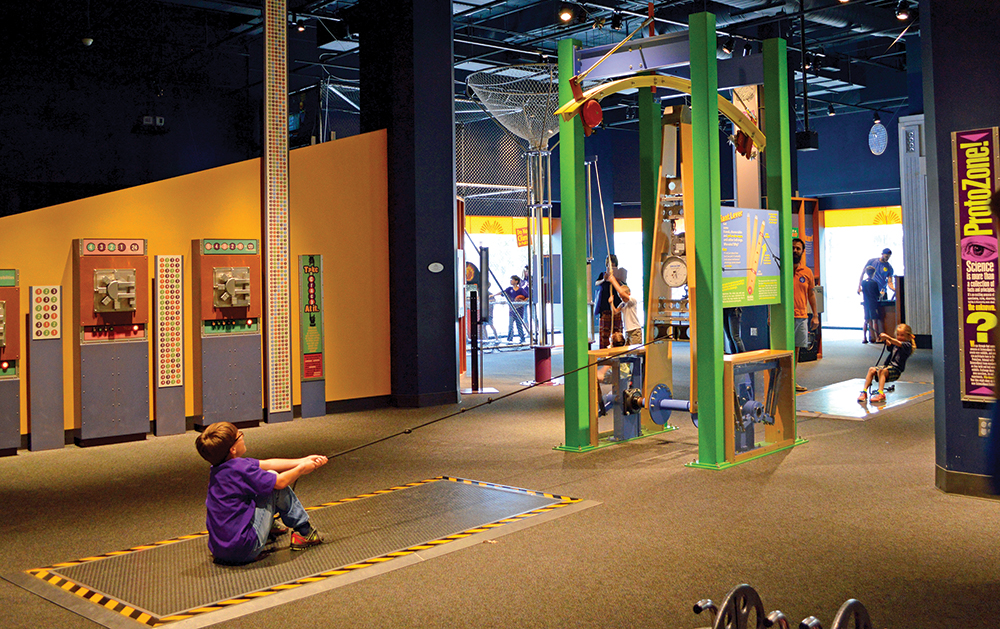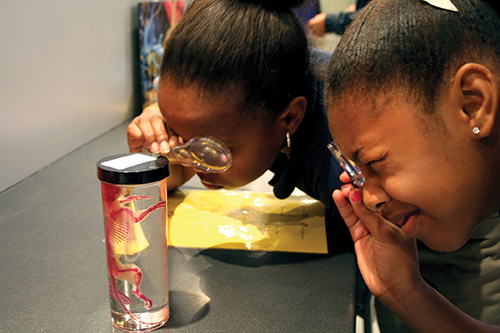
Science centers combine education with fun
By Marilyn Jones
Anyone who thinks science is only for grad students and university professors has never been to a science center and watched children — toddlers to teens — completely immerse themselves in the fun of scientific exploration.
Just ask John Hall. Well, he can only say “moo” to the pretend cow in Itty Bitty Magic City at the McWane Science Center in Birmingham, but if the 17-month-old could say more, I’m sure he’d talk all about the firetruck, water features and library area.
“He loves the cow and firetruck,” says his grandmother, Bonnie Higgins, as she and John’s grandfather Tom Higgins watch the toddler dart from one area to another.
That’s what a science center does; It sparks learning, and fuels curiosity and achievement even in children as young as John.
According to McWane Science Center President and CEO Amy Templeton, STEM (Science Technology Engineering and Math disciplines) education helps children explore and understand the world around them.
“(They) ask questions leading to new and innovative answers to issues we face today and will face in the future,” Templeton explains. “Asking ‘why’ and ‘how and ‘what if’ teaches them to use their imagination and creativity, and encourages curiosity and exploration.
“When these traits are nurtured in our children, there is no end to the things they can learn and accomplish,” she says.
McWane Science Center

Every exhibit is child-friendly and guides are available to answer questions. Throughout the day at Demonstration Station, educational programs and shows are presented, a different one every hour.
McWane’s Sea Monsters and Alabama Dinosaurs allow visitors to come face to face with the creatures that once lived in Alabama, including a 15-foot sea turtle, the Alabama tyrannosaur and dromaeosaur.
Shark & Ray Touch Tank is one of the center’s most popular exhibits. Visitors are invited to get up close and personal with white spotted bamboo sharks, bonnethead sharks, cownose stingray and southern stingrays; the tank is a great opportunity to learn more about sharks and rays. The World of Water Aquariums offers a look at several different underwater environmental areas.
At the Giant Lever a tug of war ensues. Children learn the advantage to good leverage, realizing that leverage influences who wins the tug-of-war. Dynamometers on each side of the lever allow visitors to see the force exerted, while a victory signal reveals the mechanical advantage of this simple machine.
Next to it is the Pulley Chair Lift where children scramble to be next to pull themselves up into the air using a pulley.
Gulf Coast Exploreum Science Center

The Exploreum offers more than 150 interactive exhibits and hands-on exploration for its guests. The Mobile science center’s original exhibit gallery Hand on Hall allows children the opportunity to push, pull and tinker with exhibits dedicated to unraveling the basics of electricity, simple mechanics and magnetism.
My BodyWorks helps children — and adults — learn about nutrition, healthy living and how the body works. The fun interactive exhibit hall features more than 50 custom-designed exhibits as well as a 12-foot-tall beating heart and other amazing displays designed to inspire curiosity and fun.
iHealthy Life Science Lab allows visitors to learn what body tissues look like under the microscope, how the skeletal system works, how nutrients in food actually affect the body and what germs look like.
US Space and Rocket Center
Huntsville is where America’s space program was born, where rockets were developed that put the first U.S. satellite into orbit and sent men to the moon, where the power for the space shuttle was developed, where the modules for the International Space Station were designed and built and where the next generation of spacecraft are currently being designed.
That’s a lot, plus it’s home to the US Space and Rocket Center, the world’s largest space attraction that features dozens of interactive exhibits surrounding Apollo, Mercury and Space Shuttle spacecraft.
A highlight is the Davidson Center for Space Exploration. Lined with exhibitions along each wall, the centerpiece, suspended 10 feet above the floor, is a national historic treasure, the mighty Saturn V, restored to its Apollo era readiness.
For any aspiring rocket scientists or just curious child, the space center is a great place to visit.
Whether you or your child is interested in natural science, rocket science or anything in between, Alabama has a lot to offer!
If you go:
- McWane Science Center: 200 19th Street North, Birmingham. 205-714-8300; www.mcwane.org.
- Gulf Coast Exploreum Science Center: 65 Government Street, Mobile; 251-208-6893; www.exploreum.com.
- US Space and Rocket Center: 1 Tranquility Base, Huntsville; 800-637-7223; http://rocketcenter.com.
- Cook Museum of Natural Science in Decatur will be closing this month and reopening in mid-2017 after a $17 million renovation.
“The museum will be an interactive immersion into North American biomes, from deserts to oceans to arctic tundra to hardwood forests. Instead of isolated exhibits, each exhibit will be part of a narrative explaining how the natural world works,” museum director Schelly Corry says.The 57,000-square-foot museum will feature interactive exhibits, live animals and aquariums; mounted wildlife from across North America; and collections of rocks, minerals, fossils, shells and coral.




